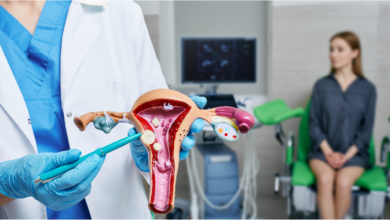
What is alopecia?
Alopecia is a general term that means hair loss. It can occur in many forms and affect people of all ages and genders.
What are the symptoms of alopecia?
Common symptoms of alopecia include:
• Thinning hair
• Hair loss in a patchy pattern
• Sudden hair loss
• Itching or burning of the scalp
Who can suffer from alopecia?
Alopecia can affect anyone, but certain factors can increase the risk, such as:
• Genetics
• Hormonal changes
• Autoimmune diseases
• Stress
• Medications
• Certain medical conditions
What are the types of alopecia?
There are several types of alopecia, including:
- Androgenic alopecia: the most common type, causing the hair on the scalp to gradually thin
- Alopecia areata: Hair loss anywhere on the body.
- Telogen effluvium: Temporary hair loss caused by stress, illness, or medication.
- Fungal infections: Can cause hair loss on the scalp.
- Scarring alopecia: Permanent hair loss caused by inflammation or scarring of the scalp.
What tests are available for alopecia?
A healthcare professional can diagnose alopecia based on a physical exam, medical history, and possible additional tests:
- Blood tests: To check for underlying medical conditions or hormonal imbalances.
- Scalp biopsy: To examine a sample of skin and hair follicles.
- Pull test: To assess how easily a hair can be pulled out.
- Light microscopy: To examine the hair shaft for abnormalities.
What is the treatment for alopecia?
Treatment of alopecia depends on the underlying cause and the type of hair loss. Some options include:
- Medications: Topical or oral medications may stimulate hair growth in some types of alopecia.
- Hair transplant: A surgical procedure to restore hair to areas with hair loss.
- Laser therapy: May stimulate hair growth in some cases.
- Camouflage techniques: Wigs, hairpieces or makeup may help hide hair loss.
What diet should I follow?
- Although there is no specific diet that can cure alopecia, a healthy and balanced diet can support overall hair health. Ensuring adequate intake of essential nutrients such as iron, zinc and biotin may be beneficial.
Which doctor will treat alopecia?
• Dermatologist
Can alopecia be completely cured?
Alopecia treatment depends on the underlying cause and the type of hair loss. Some forms of alopecia are reversible, while others may be permanent. It is important to consult a dermatologist for a personalized treatment plan.





